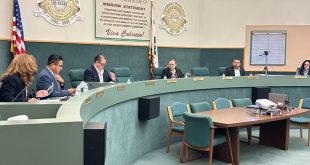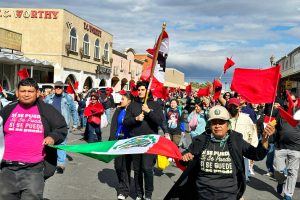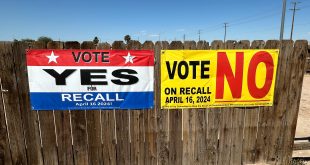The legacy of Cesar Chavez is still alive in every action, march, and fight to defend the rights of the field workers.
The Cesar Chavez Celebration Festival took place at the Rockwood Promenade on March 30 where hundreds of people attended to remember the life of Chavez and enjoy an excellent musical program. The celebrations started at Rockwood Park where a march began shouting “Si Se Puede”, “El Pueblo Unido No Sera Vencido”. It was a march of remembrance and a commitment to continue his fight.
“When we march, when we demand, when we organize that’s when Cesar Chavez is alive, he’s here with us,” Calexico Mayor Raul Ureña said.
Mexican Consul Tarcisio Navarrete said that Cesar Chavez is the universal symbol of labor right.
“The fight continues to support the field workers that continued working during the pandemic to make sure every family could have food on their table,” Navarrete said.
Martin Alvarez from the United Farm Workers said that there is still work to be done in favor of the farm workers.
“We are working with the City Council in a plan to help the workers because it’s very sad to see them sleep on the streets,” Alvarez said. “Despite the heat and the cold, they work hard to put food on our table.”
Born in Yuma, Arizona to a Mexican American family, Chavez began his working life as a manual laborer before spending two years in the United States Navy. Relocating to California, where he married, he got involved in the Community Service Organization (CSO), through which he helped laborers register to vote. In 1959, he became the CSO’s national director, a position based in Los Angeles. In 1962, he left the CSO to co-found the NFWA, based in Delano, California, through which he launched an insurance scheme, a credit union, and the El Malcriado newspaper for farm workers.
Later that decade he began organizing strikes among farmworkers, most notably the successful Delano grape strike of 1965–1970. Amid the grape strike, his NFWA merged with Larry Itliong’s AWOC to form the UFW in 1967. Influenced by the Indian independence leader Mahatma Gandhi, Chavez emphasized direct but nonviolent tactics, including pickets and boycotts, to pressure farm owners into granting strikers’ demands. He imbued his campaigns with Roman Catholic symbolism, including public processions, masses, and fasts. He received much support from labor and leftist groups but was monitored by the Federal Bureau of Investigation (FBI).






